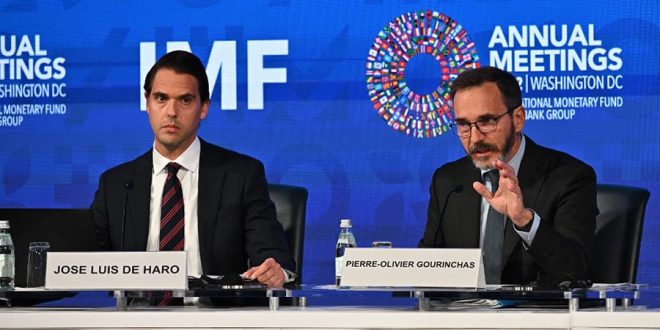14-04-2023
Bureau Report + Agencies
NEW YORK/ ISLAMABAD: The International Monetary Fund has slashed the growth outlook for cash-strapped Pakistan, forecasting the South Asian country’s fragile economy will grow just 0.5 percent this year, down from 6 percent in 2022.
 The latest data on Pakistan’s ailing economy was released by the IMF on Tuesday, when it unveiled its World Economic Outlook report in Washington, DC.
The latest data on Pakistan’s ailing economy was released by the IMF on Tuesday, when it unveiled its World Economic Outlook report in Washington, DC.
The IMF also forecast 27 percent inflation for this year for the country of more than 230 million people.
The global lender warned that unemployment would continue to rise in Pakistan which is struggling to avoid a default as it recovers from the destruction caused by last summer’s floods, which killed 1,739 people and caused $30bn in damages.
The coalition government of Pakistan’s Prime Minister Shahbaz Sharif is in talks with the IMF to receive a key tranche of a $6bn bailout package signed in 2019 by Sharif’s predecessor Imran Khan.
In recent weeks, the government slashed subsidies and raised taxes to comply with the bailout terms and secure the release of the $1.2bn portion of the deal that has been stalled since December but those measures resulted in increases in the price of food, gas and power.
Sharif’s government has become unpopular because of higher food costs, although he has blamed Khan, who is now the country’s opposition leader, for mismanaging the economy when he was in power.
 Khan was deposed last April in a no-confidence vote in parliament, and since then he has been leading rallies in a failed attempt to force Sharif to agree to an early election, which is scheduled for later this year.
Khan was deposed last April in a no-confidence vote in parliament, and since then he has been leading rallies in a failed attempt to force Sharif to agree to an early election, which is scheduled for later this year.
Minutes after the clock struck midnight on April 10 last year, Imran Khan became the first prime minister in Pakistan’s history to lose a confidence vote in parliament.
Khan had lost the support of his allies in the legislative body and in the powerful military. That fateful night in 2022 put in motion a chain of events that has left the country at a precipice as it simultaneously faces economic, political and security crises.
Going by Pakistan’s history, the removal of a prime minister was nothing unusual. In fact, in the South Asian country’s 75-year history, not a single premier has managed to complete a five-year term.
When Khan became prime minister in 2018, his critics claimed he was propped up by the military, which has directly ruled Pakistan for more than three decades and “constantly meddled” in the country’s politics, according to the former army chief General Qamar Javed Bajwa.
Since April last year, though, Khan has repeatedly targeted the same military and Bajwa in particular as the key  figures behind his removal from power. In a recent media talk, Khan said a lesson he learned from his ouster was that he should not have “trusted the army chief”.
figures behind his removal from power. In a recent media talk, Khan said a lesson he learned from his ouster was that he should not have “trusted the army chief”.
The past year has also shown that the former prime minister’s message of resistance and victimhood has not only caught the imagination of the people but has also revealed deep schisms in the state’s institutions.
The military once upon a time used to have an iron grip on the political narrative, but Islamabad-based political analyst Arifa Noor said she believes the army now is not “as strong as it used to be”.
“The class in Pakistan that used to legitimize military coups has now shifted its support to Pakistan Tehreek-e-Insaf (Khan’s political party),” she said. “Traditionally, the people that were in favor of military intervention in politics are now questioning it because they shifted their support to Imran Khan, and that perhaps is one of the reasons the military seems to be weak.”
 Pressmediaofindia
Pressmediaofindia




